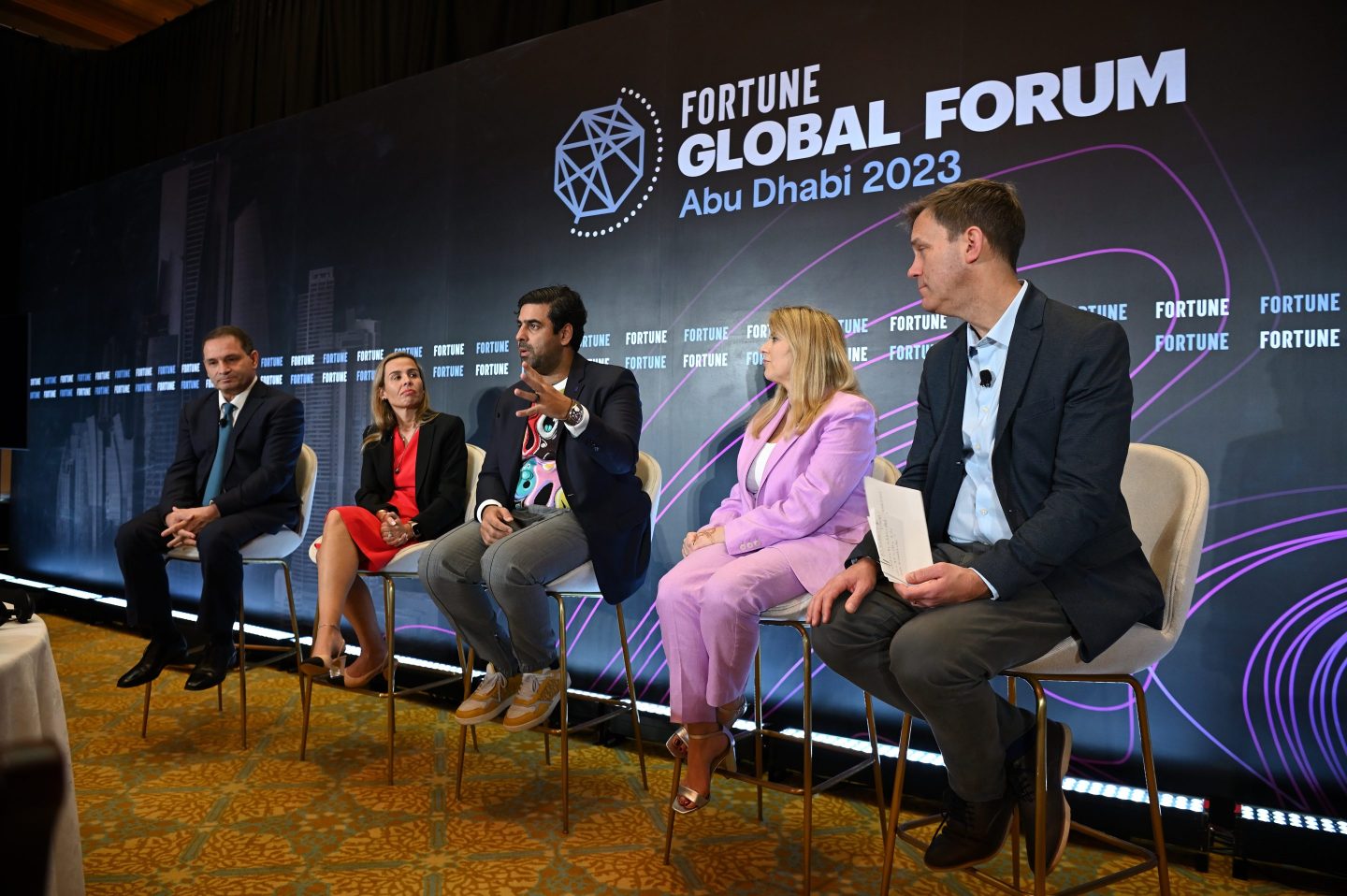Good morning!
As organizations hunt down AI talent for senior-level roles, many are overlooking the most basic skill they can teach current employees: feeding AI prompts. And it’s a skill that doesn’t require a STEM degree and years in a high-tech role.
“[Generative AI is] not really generative, it’s machine translation. That’s why the quality of the prompt is so important,” Sachin Dev Duggal, founder and chief wizard at Builder.AI, said during a panel at the Fortune Global Forum conference in Abu Dhabi on Wednesday. “It’s the quality of the prompt. It’s how you put it together. We’re very, very early. We seem to have a lot of hysteria around [believing] everything is generated, but really a lot of things are just regression, statistics, and not a lot more.”
Dev Duggal believes there are three talent “swimlanes” within AI:
1. The experts who can build the AI tools.
2. Those who can integrate AI into backend systems.
3. Front-end users who are masters at prompt engineering.
“That’s no longer training for AI. That’s training for prompting,” Dev Duggal said of front-end users. Focusing on this third swimlane allows companies to tap workers who didn’t pursue STEM fields.
“We meet with governments around the world, and they’re already [realizing] STEM is not going to work after a decade,” Dev Duggal said. “It’s going to be about art and literature and everything else because it stems the prompting and how you think about the future.”
Northwestern Kellogg School of Management Dean Francesca Cornelli said the university is working with several companies and helping them test their AI projects. She believes the academic environment acts as a “sandbox” where teams can address issues like poor data or ethical concerns without real-world consequences. But she also believes such experimentation should be practiced outside the academic world as well.
“Soon, we’ll have a lot of business leaders that say, ‘This is not keeping up with the promises.’ Well, it depends on the data or the question you ask,” says Cornelli. “The preparation is to a certain extent theoretical, but a lot is experiential. Try to get the feedback. What did you get wrong? What did you miss? That is something that I think will be essential; otherwise, there’ll be too many problems generated in business later.”
Roles that may be best suited for prompt engineering could also be the ones likely to be most impacted by generative AI.
“Those people that might be affected by [AI’s] productivity in one place…maybe it’s an opportunity for them to become the best prompt engineer,” says Chiara Marcati, a partner at McKinsey. “Maybe they were the [executive assistants], and now that EAs have been somewhat automated with Gen AI, they become the best prompter.”
Read more coverage from the Fortune Global Forum here.
Paige McGlauflin
paige.mcglauflin@fortune.com
@paidion
Reporter's Notebook
The most compelling data, quotes, and insights from the field.
Remote work coupled with the pandemic-driven flow of talent to new hubs—such as finance workers leaving New York for Miami—has led to the rise of the “meta city.” For many employees, where they live and work are no longer the same, meaning a good chunk of the workforce can participate in the economic life of a city without living there.
Around the Table
A round-up of the most important HR headlines.
- Job listing site Indeed announced it would no longer offer employees the monthly mental health days it introduced during the pandemic. Bloomberg
- A law is currently on the table in Florida’s state legislature that, if passed, would bar employees from sharing their preferred pronouns and make it a crime for employers to ask for them. Fast Company
- Tech companies like Amazon and Google are making "microcuts" to their workforces as they prioritize staying lean after years of big spending. The cuts are much smaller than industry layoffs in 2022 and earlier this year, but they show a new shift in priorities. The Wall Street Journal
Watercooler
Everything you need to know from Fortune.
Up, down, and back again. Stanford economist and flexible work whiz Nick Bloom predicts the rate of people working from home will remain just under one-third until 2026. Then, technological advancement will spur an uptick in remote work until it becomes the norm. —Jane Thier
Accountable Elon. At the New York Times DealBook Summit on Wednesday, candidly anti-union Tesla CEO Elon Musk told the audience that if the company "gets unionized, it's because we deserve it," indicating that the automaker did something wrong. His remarks come as the president of the United Auto Workers union sets his sights on Tesla after a historic win against GM, Ford, and Stellantis. —Eleanor Pringle
In defense of departures. Warner Bros. Discovery CEO David Zaslav was also at the DealBook Summit, where he defended the company's layoffs this year as necessary for restructuring and cost cutting. The result, he stated, is a “healthy company.” —Paolo Confino
This is the web version of CHRO Daily, a newsletter focusing on helping HR executives navigate the needs of the workplace. Sign up to get it delivered free to your inbox.












